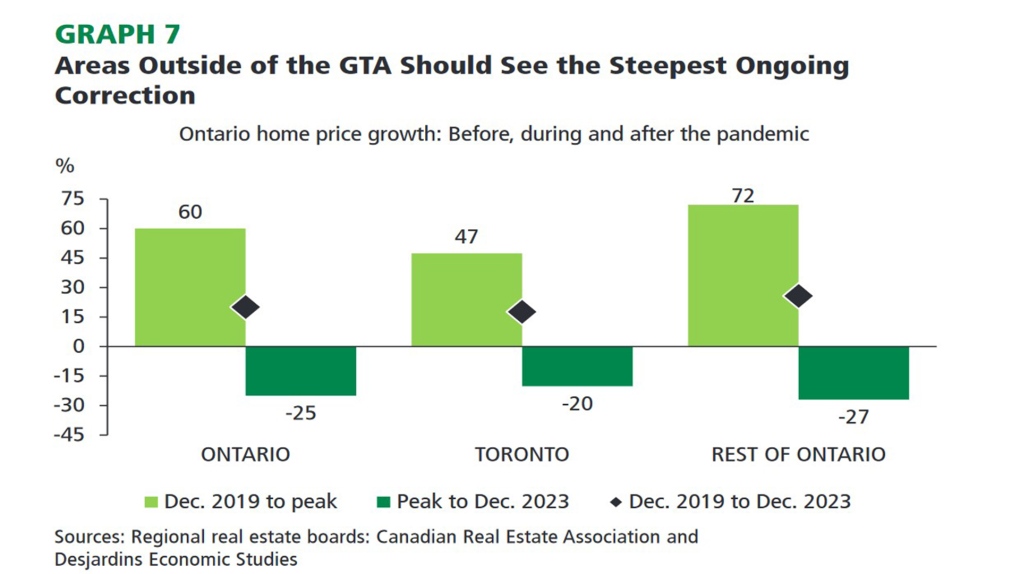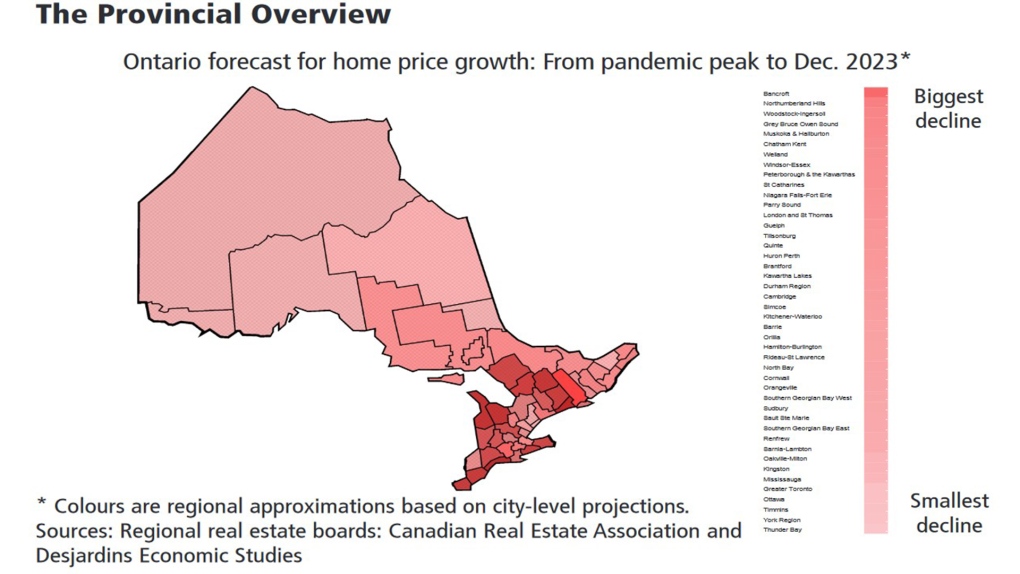These Ontario cities are expected to see the biggest home price declines
While Toronto has seen a significant dip in home prices as borrowing costs have gone up over the past year, other places in Ontario are seeing an even more dramatic drop according to a new report released Monday.
The report, from economists at financial services company Desjardins, examined the Ontario housing market in the context of recent developments, such as interest rate hikes and supply.
It found that Ontario is projected to see the biggest correction compared to other provinces in Canada, an anticipated 25 per cent drop by the end of 2023 from the market’s peak.
However within Ontario, the GTA is not the location where prices are projected to fall the most.
“Given nearly half of existing home sales take place in the Greater Toronto Area (GTA), that market tends to garner the most attention,” the report notes. “But during the pandemic, it was surrounding communities that grabbed more of the headlines. Home prices rose significantly in the GTA, but not nearly as much as they did in smaller Ontario communities or nationally for that matter. And these places are expected to continue seeing the biggest correction.”
Places like Windsor, Oshawa, Sudbury and London saw skyrocketing home prices from Dec. 2019 to the market’s peak during the pandemic, rising between 75 per cent to close to 100 per cent in a short period. But that means there’s a long way to fall from those peaks now that the real estate market has cooled off.
 (Desjardins / Handout)
(Desjardins / Handout)
Bancroft is expected to see the steepest decline in home prices by the end of the year, with a projected 50 per cent drop. That’s followed by Northumberland Hills (-42 per cent), Woodstock-Ingersoll (-40 per cent), Grey Bruce Owen Sound (-39 per cent) and Muskoka & Haliburton (-39 per cent).
Areas where the price is expected to fall roughly 30-38 per cent by the end of the year include Durham, London, Windsor, Guelph, Peterborough, Barrie, Orilia, Kitchener, Niagara Falls and other areas.
While prices in the GTA are still projected to fall by the end of 2023, the drop is anticipated to be softer, more like 20 per cent from peak.
Mississauga (-23 per cent), York Region (-19 per cent), Ottawa (-20 per cent), Timmins (-20 per cent) and Thunder Bay are also projected to see drops of less than 25 per cent.
“While analysts and the media follow Toronto and all‑Ontario real estate data closely, there is significant variability across communities within Canada’s largest province. Supported by buyers’ desire for more space when working and educating children from home, homebuying activity surged most significantly in smaller Ontario centres during the pandemic,” the report’s authors write. “While we expect home sales and values to find a bottom in the second half of 2023, these smaller cities should continue to experience some of the most pronounced corrections in Ontario.”
 (Desjardins / Handout)
(Desjardins / Handout)
The report says the “erosion of affordability has made life challenging for households across Ontario” and calls for the provincial government to be mindful of smaller communities when proceeding with its housing plan.
“As policymakers move forward on ambitious plans to increase the housing supply to improve affordability, considering local market needs will be of paramount importance,” the report states.
PEOPLE LEAVING ONTARIO IN SEARCH OF CHEAPER LIVING
The report also notes that the erosion of housing affordability during the pandemic has driven Ontarians not just farther away from urban centres, but out of the province completely.
“Families have been leaving the least affordable parts of the province for greener pastures elsewhere in Ontario,” the report says. “Residents have also been leaving Ontario altogether, with the Atlantic provinces being the preferred destination since the start of the pandemic, and Alberta more recently.”
While Toronto remains the most unaffordable city in the province, it’s followed closely by St. Catharine’s, Hamilton and Kitchener.
While one might expect the exodus to more affordable parts of the country to ease pressure on housing markets within Ontario, the report says that rapid population growth due to international migration and the admission of non-permanent residents is keeping demand strong going forward, even in an environment of sustained high interest rates.
While cheaper home prices might sound good to some, they are to an extent offset by higher borrowing costs.
Ultimately, the reports says, affordability is not exected to improve much for the next two years or so.
“While affordability in Canada’s most populous province is expected to improve as home prices continue to fall and borrowing costs ultimately come down, we don’t anticipate that it will return to its pre‑COVID level by the end of 2024,” the report says.
The latest report comes as the Bank of Canada get set to announce another interest rate decision on Wednesday.
PROJECTED DROPS FOR 2023 ACCORDING TO DESJARDINS
Bancroft -50%
Northumberland Hills -42%
Woodstock-Ingersoll -40%
Grey Bruce Owen Sound -39%
Muskoka & Haliburton -39%
Chatham Kent -38%
Welland -38%
Windsor-Essex -37%
Peterborough & the Kawarthas -37%
St Catharines -37%
Niagara Falls-Fort Erie -36%
Parry Sound -36%
London and St Thomas -36%
Guelph -35%
Tillsonburg -34%
Quinte -34%
Huron Perth -34%
Brantford -34%
Kawartha Lakes -33%
Durham Region -33%
Cambridge -32%
Simcoe -32%
Kitchener-Waterloo -32%
Barrie -31%
Orillia -30%
Hamilton-Burlington -30%
Rideau-St Lawrence -30%
North Bay -30%
Cornwall -30%
Orangeville -29%
Southern Georgian Bay West -29%
Sudbury -28%
Sault Ste Marie -28%
Southern Georgian Bay East -28%
Renfrew -27%
Sarnia-Lambton -27%
Oakville-Milton -24%
Kingston -24%
Mississauga -23%
Greater Toronto -20%
Ottawa -20%
Timmins -20%
York Region -19%
CTVNews.ca Top Stories

opinion Tom Mulcair: Prime Minister Justin Trudeau's train wreck of a final act
In his latest column for CTVNews.ca, former NDP leader and political analyst Tom Mulcair puts a spotlight on the 'spectacular failure' of Prime Minister Justin Trudeau's final act on the political stage.
B.C. mayor gets calls from across Canada about 'crazy' plan to recruit doctors
A British Columbia community's "out-of-the-box" plan to ease its family doctor shortage by hiring physicians as city employees is sparking interest from across Canada, says Colwood Mayor Doug Kobayashi.
'There’s no support': Domestic abuse survivor shares difficulties leaving her relationship
An Edmonton woman who tried to flee an abusive relationship ended up back where she started in part due to a lack of shelter space.
opinion King Charles' Christmas: Who's in and who's out this year?
Christmas 2024 is set to be a Christmas like no other for the Royal Family, says royal commentator Afua Hagan. King Charles III has initiated the most important and significant transformation of royal Christmas celebrations in decades.
Baseball Hall of Famer Rickey Henderson dead at 65, reports say
Rickey Henderson, a Baseball Hall of Famer and Major League Baseball’s all-time stolen bases leader, is dead at 65, according to multiple reports.
Arizona third-grader saves choking friend
An Arizona third-grader is being recognized by his local fire department after saving a friend from choking.
Germans mourn the 5 killed and 200 injured in the apparent attack on a Christmas market
Germans on Saturday mourned the victims of an apparent attack in which authorities say a doctor drove into a busy outdoor Christmas market, killing five people, injuring 200 others and shaking the public’s sense of security at what would otherwise be a time of joy.
Blake Lively accuses 'It Ends With Us' director Justin Baldoni of harassment and smear campaign
Blake Lively has accused her 'It Ends With Us' director and co-star Justin Baldoni of sexual harassment on the set of the movie and a subsequent effort to “destroy' her reputation in a legal complaint.
Oysters distributed in B.C., Alberta, Ontario recalled for norovirus contamination
The Canadian Food Inspection Agency has issued a recall due to possible norovirus contamination of certain oysters distributed in British Columbia, Alberta and Ontario.


































